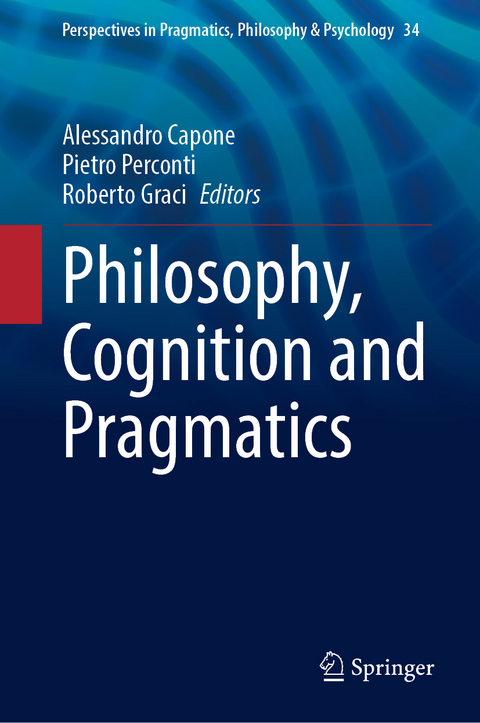
Philosophy, Cognition and Pragmatics
Springer International Publishing (Verlag)
978-3-031-50108-1 (ISBN)
This book contains essential contributions to enrich and broaden the application field of pragmatics. It provides an example of how the fruitful reflections and refined conceptual distinctions born in the philosophical field can find a practical application in addressing social, cognitive, clinical, and psychological problems. Its chapters address, from different points of view, the relationship between pragmatic linguistics and philosophy, and outline the possible application of pragmatic theories to different domains. Developed during the third Pragmasophia international conference, whose name is derived from the Greek terms pi Gammami (action, fact) and s (knowledge, science), the book aligns itself with its aim to study human actions and activities and how they take shape through language. But 'Pragma' and 'Sophia' also signal another purpose: highlighting the importance of creating links between empirical investigations on language use, and more traditional philosophical approaches. In this reading, 'Pragma' represents the experimental goal devoted to analysing and interpreting language facts. In contrast, the term 'Sophia' recalls the original vocation of past philosophers to pursue an ideal of 'pure knowledge', disconnected from any practical-economic interest. While maintaining the conference's original purpose of encouraging productive comparisons between different approaches, the book consists of two sections: first, on philosophical approaches, recalls more theoretical aspects (closer to the term 'Sophia'); the second, 'Inferential and Cognitive Pragmatics,' addresses more practical issues affecting domains such as Greek literature, pragmatic disorders, dictionary entries, and speech analysis. The reader, whether in linguists, philosophy or psychology, obtains a complete overview of the most advanced current research lines, both theoretical and empirical, and thus contributes to broadening the scope of pragmatics.
Alessando Capone has a doctorate in linguistics (University of Oxford) and a doctorate in philosophy of language (University of Palermo). He is full professor of linguistics. He is also a series editor for Springer, an editor for Intercultural Pragmatics, author of five monographs and three books of poems, editor of 16 international volumes, and author of papers published in top international journals. He is a board member of numerous international journals.
Pietro Perconti is full Professor of Philosophy of Mind at the University of Messina. Perconti studied philosophy at the Universities of Palermo and Berlin (Freie Universität). He has undertaken significant international roles, serving as a visiting scholar at the Donders Institute for Brain, Cognition and Behaviour at Radboud University Nijmegen, Netherlands, and the New York University. Perconti's primary research areas encompass social cognition, consciousness, and the societal implications inherent in cognitive science. Since 2018, he has assumed the directorship of the COSPECS of the University of Messina.
Roberto Graci has a PhD in Cognitive Sciences from the University of Messina. His work focuses on the communicative competence of people with aphasia and its implication on the semantics/pragmatics debate. He has published several papers emphasising the productive comparison between theoretical pragmatics and speech-language pathology. Roberto Graci has also actively participated in important events on linguistics and philosophy of language, including Pragmasophia 3 and the XIV Congress of SIFA (Italian Society of Analytical Philosophy).
Pt. 1 - Philosophical approaches.-Chapter 1. Wayne Davis. "Cheap Propositions".-Chapter 2. Alessandro Capone. "On the distinction between reference and referential presupposition".-Chapter 3. Nathan Salmón. "Synonymy".- Chapter 4. Nathan Salmón. "Sleeping Beauty: Awakenings, Chance, Secrets, and Video".-Chapter 5. Grace G. Campbell. "Situated Agency and Constitutive Moral Luck".-Chapter 6. Richard Warner. "Pragmatics and Semantics: Grice 1968, Schiffer 2015, Schiffer 1972".-Chapter 7. Denis Delfitto (Corresponding Author) and Maria Vender. "Puzzling data, beautiful computations: A new analysis of when 'or' means 'and'".-Chapter 8. Dennis Kurzon. "FAILED DIRECTIVES and FATAL COMMISSIVES. Speech act analysis of Oscar Wilde's Salome.-Pt. 2 - Inferential and cognitive pragmatics.-Chapter 9. Paola Radici Colace. "For a definition of hyperbola on the scene of ancient Greek theater: situations and lexicon".- Chapter 10. Keith Allan. "The semantics and pragmatics of names and naming".- Chapter11. Luigi Pavone. "An inscriptional account for mixed quotation".- Chapter 12. Louise Cumming. "Cognitive Aspects of Pragmatics Disorders".- Chapter 13. Caterina Scianna. "Irony as a complex social phenomenon".-Chapter 14. Roberto Graci. "Exploring the neurological substrates of pragmatics: insights from neuroscience".-Chapter 15. Daniele Panizza. "Presuppositions in indirect reports: a window into the semantics/pragmatics interface".
| Erscheinungsdatum | 25.03.2024 |
|---|---|
| Reihe/Serie | Perspectives in Pragmatics, Philosophy & Psychology |
| Zusatzinfo | XIII, 293 p. 1 illus. |
| Verlagsort | Cham |
| Sprache | englisch |
| Maße | 155 x 235 mm |
| Themenwelt | Geisteswissenschaften ► Sprach- / Literaturwissenschaft ► Sprachwissenschaft |
| Schlagworte | clinical research • Cognition • Irony • Logic • mixed quotation • philsophy • Pragmatics • Presupposition • Proposition |
| ISBN-10 | 3-031-50108-X / 303150108X |
| ISBN-13 | 978-3-031-50108-1 / 9783031501081 |
| Zustand | Neuware |
| Informationen gemäß Produktsicherheitsverordnung (GPSR) | |
| Haben Sie eine Frage zum Produkt? |
aus dem Bereich


